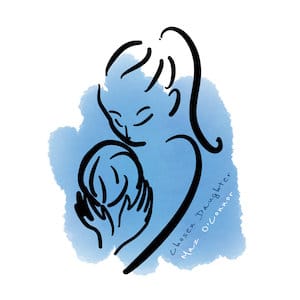 Maz O’Connor – Chosen Daughter
Maz O’Connor – Chosen Daughter
Restless Head Records/Hudson Records – 25 October 2019
For Maz O’Connor’s fourth album, she was heavily influenced by a return to her grandmother’s childhood home in Ireland and the trials and tribulations suffered by her and other female family relatives, among them being abused while in domestic service, forced adoption and an aunt’s emigration to America as a nun in order to ensure the welfare of her sisters. No surprise then that the songs have a strong feminine perspective, but it’s also one that doesn’t shrink from observing how obsequience to the patriarchy, especially strong in Ireland, to avoid being seen as challenging could prove to be self-destructive.
Her mother proved the springboard to the album’s themes. While they were both watching the film Philomena (a film about a mother’s search for her forcibly adopted son in Ireland), her mother revealed that she had been adopted from a Catholic mother and baby home run by nuns and that her birth mother had been an Irish domestic servant in England when she fell pregnant and was given little option by circumstance but to give up the child.
It’s the latter that informs the lyrics of Predator, a sparsely strummed, brooding lament as she sings how, recounting her seducer and abandonment, “Nobody saves a girl unmade/Nobody prays for me”. That fate of abandonment also bedrocks the shiveringly fingerpicked Finer than I where, with string arrangement by Kate St. John, the narrator muses on how her errant lover has found a new, ‘finer’ love from a wealthy family in London leaving her working in the factory, “Waiting like a widow, many years after the war”, still clinging to the hope of his return, the final lines referencing The Water Is Wide.
Pure of voice, in addition to the string quartet, she’s joined on the album by Kevin McGuire on double bass, drummer and producer Matty Foulds, guitarist Neill MacColl and David Milligan on piano and keys. The album opener, Mary, is a wistful, piano-accompanied slow waltz reflection of mothers and daughters, of childhood and loss (“I don’t see you round here no more/And I don’t hear her calling your name/Somebody told me they saw you last Winter/Carrying all of the blame”), from whence the album title, a reference to adoption, comes.
In her research, O’Connor also learnt that, back in 1920s Ireland, her father’s mother was one of five girls born in Waterford who were all left destitute when their father died, the eldest, sixteen-year-old Mona chose to move to America and become a nun in return for the Order of the Religious Sacred Heart of Mary housing and educating her sisters, Terry, Gertie, Cicely and Brenda, in England, her story related in the strings-caressed piano ballad San Francisco.
It’s to Shakespeare she turns for Cordelia, the light folk melody and strings arrangement taking the tragic youngest daughter of King Lear as its title as exemplifying a woman who stands up to a man in power and suffers the consequence, her story and, in the song, seeking to be honest and courageous in calling out those who do her wrong, chiming with the #MeToo movement.
The conflict between wanting female self-empowerment and the pressures of not upsetting the patriarchy form the basis for the two following numbers, Party Girl a simple fingerpicked song in which the narrator demurs “Don’t mind me/I won’t get in your way/I’ll be here all night/And I’ll look just right/And I’ll say all the things that I should say”, stifling her true self to be accepted and attractive by conforming to what the men want of their women, but ending up in depression.
Accompanied on piano and mingling Amos and Mitchell influences, Invincible looks at the same picture from a different perspective, pills and booze numbing the feelings and imparting a deluded sense of being in control (“No he doesn’t want to stay/At least that saves you the pretending”) so that “No memories come knocking anymore”. It’s a thread subsequently picked up on piano hangover ballad In The Morning as the narrator wakes to memories of “all those stupid fake and self-hating things I do” before, on Loved Me Better, another #MeToo inspired song, she looks to “trust my own mind/And get myself together”, finally acknowledging the wreck of the relationship wasn’t of her making as she sings “Didn’t you let me think I wasn’t good enough/Didn’t you watch me feed my shame” and concludes “You should have loved me better”.
Dysfunctional relationships of different degrees also underpin Bones and Nicotine, the former finding the woman opening up her fears and secrets and asking her lover to do the same, but he telling her to go slow while in the latter, a stripped back acoustic strum, the couple are each other’s nicotine patch, surrogates of former failed relationships that still course through their veins.
Both a very personal but equally universal album about the iniquities of the gender imbalance in terms of dominance, control, self-perceptions and relationships, veined, as per the title, both with a sense of being wanted and the need to feel so, let it bring out the very best of your musical maternal instincts.
Chosen Daughter is out on 25 October 2019
